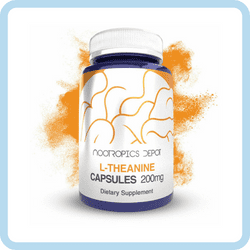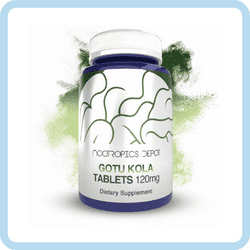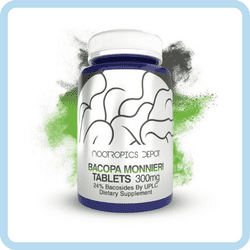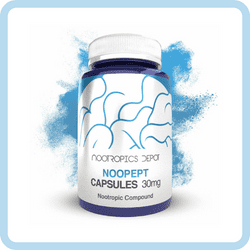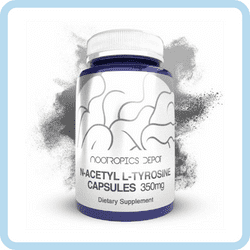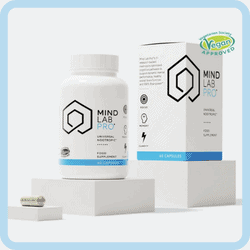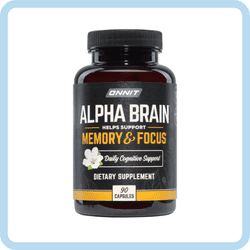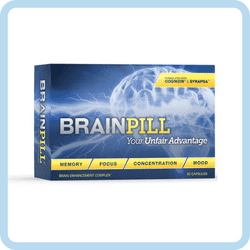Note: Supplements are not required to undergo the same rigorous testing process as prescription drugs. Be sure to speak with your doctor before using supplements to treat symptoms or ailments.
There’s been a significant rise in anxiety disorders in America. In fact, it’s the most common mental illness in the United States, affecting approximately 18.1% of the adult population every year.
It’s no secret that anxiety is a crippling and often debilitating disorder. It can make it difficult to function at school or at the office and even harder to enjoy a high quality of life. There are many different treatments for anxiety — however, cognitive behavioral therapy, conventional anxiolytics, psychotherapy, and counseling might not work for everyone.
This is why nootropics may be the answer for some suffering from anxiety. In fact, some people say they feel “like their old self again” after just a few days of use.
Our Top Three Nootropic Stacks for Beating Anxiety
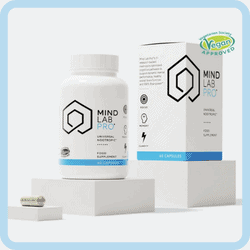
Pre-biotic capsules
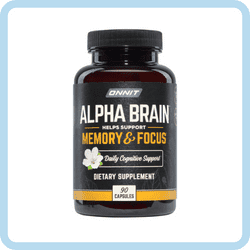
Vegetarian, Keto & Diet-Friendly
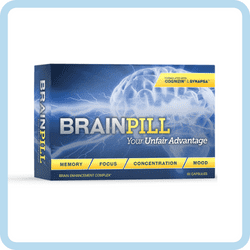
Slow-acting, Less Side Effects
Introduction to Nootropics
Nootropics (sometimes called “smart drugs”) were first synthesized by the Romanian chemist Dr. Corneliu E. Giurgea in 1964. The general aim of nootropic research is to find new drugs capable of enhancing cognitive activity of the brain. He wanted to improve memory and concentration, as well as reduce anxiety and depression without the side effects associated with other psychotropic medications.
Many use nootropics to improve their general mental health and relieve symptoms of anxiety. Nootropics have been found to improve mental performance by enhancing cognitive functions and helping users overcome anxiety, as well as increase mental clarity, alertness, and even energy levels. Many people take these as supplements to increase their productivity at work or college. In fact, some nootropics are included in workout supplements as a focus enhancer. Since they don’t require a prescription, they can easily be found at drug and grocery stores.
Nootropics for Anxiety
Benzodiazepines are the usual class of drugs used to treat anxiety. According to the Controlled Substances Act, they fall within Schedule IV classification and usually require a prescription. They work to induce a calming effect by enhancing the activity of gamma-aminobutyric acid, which functions as the primary inhibiting neurotransmitter for the central nervous system. Unfortunately, benzodiazepines have been linked to negative side effects like nausea, memory loss, confusion, and depression.
Nootropics are cognitive enhancers that work on various levels to improve mental function — primarily by allowing more oxygen and blood to pass through the blood-brain barrier and protect brain cells. They’re not necessarily intended to relieve anxiety per se, but lessen the chances of sensations of anxiety becoming overwhelming.
What is Anxiety Disorder?
Anxiety disorders are a set of mental illnesses that are characterized by intense, persistent anxiety or fear. Although the causes and effects of anxiety aren’t completely understood, we do know that there are behaviors that can trigger or worsen the condition. There are many different classifications of anxiety disorder, so we’ll discuss the two most prevalent in detail below, along with some of the most common symptoms of anxiety.
Generalized Anxiety Disorder
WebMD states, “Generalized anxiety disorder (or GAD) is marked by excessive, exaggerated anxiety and worry about everyday life events for no obvious reason.” Individuals suffering from GAD have a tendency to anticipate disaster at all times and be overly affected by concerns surrounding everyday concepts like money, health, relationships, or work. People affected by GAD worry more than is warranted or necessary about actual events, or might obsess and expect the worst of a situation — even without apparent cause for concern.
Social Anxiety Disorder
Social anxiety disorder is a mental disease where a person is prone to panic in social situations. This can stem from a fear of embarrassment or judgment. Sufferers of social anxiety tend to be anxious in situations where they lack control over how they are perceived, which is quite draining on their mental energy. Everyday situations like giving presentations, eating with others, or even speaking in public can sometimes be enough to trigger anxiety attacks. Social anxiety symptoms can include excessive sweating or even heart palpitations.
Common Anxiety Symptoms
Generally speaking, anxiety is a feeling of worry, nervousness, or unease. Its onset can be mild to intense and can come on suddenly or gradually. Common symptoms include feeling agitated or restless, a sensation of helplessness, trouble concentrating, feeling like you’re on edge or “about to explode,” and experiencing physical symptoms such as a rapid heartbeat, sweating, and dizziness.
Best Nootropics for Anxiety Disorders
Here are six of the best nootropics, that have been found to treat the symptoms of anxiety disorders. Most are available without a prescription.
1. L-Theanine
L-theanine is an amino acid found in green tea that many people take to improve brain function. It’s also been shown to be effective in reducing anxiety. It does this by promoting alpha brain waves, which are associated with a state of relaxation.
2. Gotu Kola
Gotu kola is an herb that has been used for centuries in Ayurveda medicine to treat a variety of conditions, including anxiety. Gotu kola contains compounds that may help to calm the mind and relax the body. It is a potent nootropic that can combat nervousness.
3. Bacopa monnieri
Bacopa monnieri is a nootropic herb that has been traditionally used in Ayurveda for anxiety and stress relief. A 2012 study showed that it increased cerebral blood flow better than ginkgo biloba, which brings decreases the amount of buildup of cytotoxic waste.
A double-blind, placebo-controlled study found that bacopa monnieri effectively reduced anxiety symptoms in participants with mild to moderate anxiety disorders. The mechanism by which bacopa monnieri exerts its anti-anxiety effects is not fully understood, but it is thought to involve the modulation of serotonin and dopamine levels in the brain.
4. Noopept
Noopept is a strong, non-prescription nootropic supplement that has been shown to be effective in reducing anxiety by stimulating the production of acetylcholine, a neurotransmitter associated with brain function and memory.
Noopept also helps to increase levels of serotonin and dopamine, which play a role in mood regulation. It’s considered to be one of the most potent nootropics available. Still, it may carry a small risk of psychiatric adverse effects, so be sure to consult with a physician before beginning to supplement with it. Some users report side effects from regular use of noopept such as headache, nausea, or fatigue usually dissipate over time.
5. L-tyrosine
L-tyrosine is one of the most popular nootropics for social anxiety. It is a precursor to dopamine and norepinephrine, two neurotransmitters known to play a role in mood regulation. L-tyrosine helps to keep these neurotransmitters at their optimal levels, which can help improve mood and reduce feelings of fear. L-tyrosine is also known to boost brain power and memory, making it a beneficial supplement for those who want to improve their overall brain health.
6. Modafinil
Modafinil is a powerful nootropic that is only available through prescription in most countries for the treatment of narcolepsy and other conditions that cause uncontrollable drowsiness; it’s generally regarded more as a wakefulness-promoting agent, than a cognitive enhancer. Though it is considered non-addictive, there have been reports of dependence and withdrawal linked to high dosages. Studies show that Modafinil has limited effect as a cognitive enhancer on non-sleep-deprived adults.
Best Nootropic Stacks for Anxiety Disorders
It’s a common misconception that you have to commit to a single nootropic to benefit from their ability to improve cognitive function, moderate the stress response, fight anxiety, or keep social anxiety in check. Below are three popular and effective nootropics that we’ve tested; they range from mild products with gradual onsets to powerful and fast-acting formulations.
Mindlab Pro Anxiety Nootropic
Mind Lab Pro Anxiety Nootropic contains a combination of citicoline, phosphatidylserine, bacopa monnieri, lion’s mane mushroom, L-tyrosine, L-theanine, Rhodiola rosea, maritime pine bark, and 3 energy-boosting B-vitamins. Some say it reducews brain fog and helps keep the mind calm so you can better focus on what you’re doing. It can start to improve cognitive functioning as quickly as 30 minutes after taking a 2-capsule dose, while noticeable effects on anxiety levels may come after a week of continued use. The calming effects might initially make you feel sleepy, but this fades as you grow accustomed to the formulation.
Mind Lab Pro is 100% stimulant-free and delivers results that subtly accumulate over time. It is third-party tested and validated and uses prebiotic capsules rather than cellulose or gelatin.
Alpha Brain by Onnit
Alpha Brain by Onnit vegetarian capsules contain B6 and Uncaria tomentosa, but is primarily made up of 3 proprietary blends: Onnit Flow Blend (L-tyrosine, L-theanine, oat straw, and phosphatidylserine), Onnit Focus Blend (L-Alpha glycerylphosphorylcholine, bacopa monnieri, and huperzia serrata), and Onnit Fuel Blend (L-Leucine, vinpocetine, and pterostilbene). Due to its potency, this particular nootropic should be taken after a meal.
Even when taken properly, Alpha Brain can leave a small percentage of sensitive users experiencing bouts of nausea, while most others experience no unwanted side effects. It’s a stack worth trying if your body is already accustomed to many of its ingredients, but we wouldn’t recommend this to those just beginning to experiment with nootropics. It’s gluten-free, dairy-free, and nut-free while being both keto and paleo diet friendly.
BrainPill
BrainPill tries to enhance cognitive function using 13 natural ingredients: citicoline, tyrosine, phosphatidylserine, L-theanine, bacopa monnieri, huperzine-A, vinpocetine, ginkgo biloba, a DHA complex, and four B-vitamins. This stack is easiest on the body during testing but also slower acting.
Due to the amounts and blend of ingredients, this supplement needs to build up in your body before you begin to notice significant changes. This mechanism has caused a lot of mixed reviews for this product, but it’s a good introduction to nootropic stacks that won’t shock your body.
Brain Pill is often marketed as an anti-stress supplement since it indirectly reduces the number of stress hormones released by the human brain, which may help people accomplish their goals.
It’s important to note that everyone’s body reacts differently to different combinations of ingredients, so we recommend trying mild stacks at lower doses first if you’re not yet sure about what ingredients work best for you. If you’re unsure, always consult with a physician first.
Frequently Asked Questions
What is the best supplement for anxiety and panic attacks?
Many different nootropics might help with anxiety, but some of the most popular include: phenibut, L-theanine, passionflower, and valerian root. Each of these has been said to help reduce anxiety levels and improve overall mood.
What is the most potent nootropic?
As of now, there is no agreed “strongest nootropic,” but many think that NooCube is the most potent nootropic stack currently on the market.
Can nootropics increase anxiety?
Though nootropics function in a variety of ways that can affect each person differently, there is no published research that indicates increased anxiety being a risk of nootropic supplementation. Some may, however, have side effects that can arise due to conflicts with other medications or improper dosing. Speak with a doctor before if you are taking other medications!
What dosage of nootropics should I take for anxiety?
This all depends on what you’re taking, whether it be an individual nootropic supplement or nootropic stack. When trying a new supplement, it’s always best to start at the lower range of the recommended dosages or consult with your physician first.
- Fear of Stupidity: Effects and Treatments for Stultophobia - February 16, 2024
- Body Scan Chronicles: Our Publisher Breaks Through Chronic Pain With Meditation - January 23, 2024
- VR Meditation App: A Beginner’s Guide to Virtual Reality Meditation - July 13, 2023

